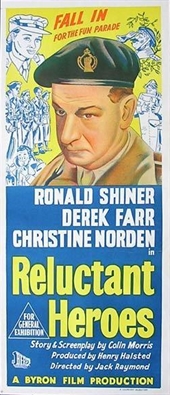Reluctant Heroes
| Reluctant Heroes | |
|---|---|
 Australian daybill poster | |
| Directed by | Jack Raymond |
| Written by | Colin Morris |
| Based on | the play Reluctant Heroes by Colin Morris |
| Produced by | Henry Halstead (as Henry Halsted) |
| Starring | Ronald Shiner Derek Farr Christine Norden |
| Cinematography | James Wilson |
| Edited by | Helen Wiggins |
| Music by | Tony Lowry |
Production company | Henry Halstead Productions (as Byron Films) |
| Distributed by | Associated British-Pathé (UK) |
Release date | 1951 |
Running time | 80 minutes |
| Country | United Kingdom |
| Language | English |
Reluctant Heroes is a 1951 British comedy filmed in Technicolor. It is based on the farce by Colin Morris. Directed by Jack Raymond, it stars Ronald Shiner as Sergeant Bell[1][2] or as Sergeant Able.[2] It was produced by Henry Halsted and Byron Film. The play, which had premiered at the Whitehall Theatre the previous year, was the first of the Brian Rix company's Whitehall farces.[3]
Plot summary
This comedy is set in an army boot camp. It displays a drill sergeant who must somehow turn an inept group of recruits into real soldiers.
Cast
- Sergeant Bell - Ronald Shiner
- Michael Tone - Derek Farr
- Gloria Dennis - Christine Norden
- Horace Gregory - Brian Rix
- Trooper Morgan - Larry Noble
- Pat Thompson - Betty Empey
- Penny Roberts - Angela Wheatland
- Sgt. McKenzie - Anthony Baird
- Capt. Percy - Colin Morris
- Lt. Virginia - Elspet Gray
Reception
Box Office
The film is listed in the 12 most popular films at the British box-office in 1952, in an article in the Sydney Sunday Herald that cited Ronald Shiner as the UK's favourite film star of the year.[4][5]
Brian Rix asserts in his autobiography that it was the UK's top box office film of the year.[6]
References
- ^ "Reluctant Heroes (1951) - Trailers, Reviews, Synopsis, Showtimes and Cast". AllMovie. Retrieved 16 September 2013.
- ^ a b Reluctant Heroes at IMDb
- ^ Ray Cooney Obituary: John Chapman, The Guardian, 8 September 2001
- ^ "COMEDIAN TOPS FILM POLL". The Sunday Herald. Sydney, NSW: National Library of Australia. 28 December 1952. p. 4. Retrieved 24 April 2012..
- ^ Thumim, Janet. "The popular cash and culture in the postwar British cinema industry". Screen. Vol. 32, no. 3. p. 259.
- ^ Rix, B. (1975) My Farce From My Elbow, Secker & Warburg, London.
External links
